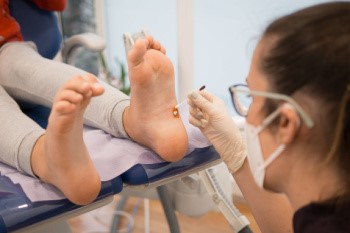 Plantar warts, also known as verrucas, can be painful and disruptive. These growths, caused by the human papillomavirus, or HPV, often appear as rough, grainy lesions on the weight-bearing areas of the foot, such as the ball and heel. Plantar warts develop when HPV infects the outer layer of skin on the foot, typically through cuts, cracks, or breaks in the skin. Certain factors, such as a weakened immune system or previous bouts of plantar warts, can increase susceptibility. Treatment options include prescription strength medications containing salicylic acid, cryotherapy, laser treatments, or surgical removal. Because it can be difficult to eradicate plantar warts on your own, a podiatrist can provide tailored treatment options to alleviate discomfort and minimize the risk of recurrence. If you have plantar warts, it is suggested that you schedule an appointment with a podiatrist for an exam and treatment options.
Plantar warts, also known as verrucas, can be painful and disruptive. These growths, caused by the human papillomavirus, or HPV, often appear as rough, grainy lesions on the weight-bearing areas of the foot, such as the ball and heel. Plantar warts develop when HPV infects the outer layer of skin on the foot, typically through cuts, cracks, or breaks in the skin. Certain factors, such as a weakened immune system or previous bouts of plantar warts, can increase susceptibility. Treatment options include prescription strength medications containing salicylic acid, cryotherapy, laser treatments, or surgical removal. Because it can be difficult to eradicate plantar warts on your own, a podiatrist can provide tailored treatment options to alleviate discomfort and minimize the risk of recurrence. If you have plantar warts, it is suggested that you schedule an appointment with a podiatrist for an exam and treatment options.
Plantar warts can be very uncomfortable. If you need your feet checked, contact Brent Harwood, DPM from Southeast Podiatry. Our doctor will assist you with all of your foot and ankle needs.
About Plantar Warts
Plantar warts are the result of HPV, or human papillomavirus, getting into open wounds on the feet. They are mostly found on the heels or balls of the feet.
While plantar warts are generally harmless, those experiencing excessive pain or those suffering from diabetes or a compromised immune system require immediate medical care. Plantar warts are easily diagnosed, usually through scraping off a bit of rough skin or by getting a biopsy.
Symptoms
- Lesions on the bottom of your feet, usually rough and grainy
- Hard or thick callused spots
- Wart seeds, which are small clotted blood vessels that look like little black spots
- Pain, discomfort, or tenderness of your feet when walking or standing
Treatment
- Freezing
- Electric tool removal
- Laser Treatment
- Topical Creams (prescription only)
- Over-the-counter medications
To help prevent developing plantar warts, avoid walking barefoot over abrasive surfaces that can cause cuts or wounds for HPV to get into. Avoiding direct contact with other warts, as well as not picking or rubbing existing warts, can help prevent the further spread of plantar warts. However, if you think you have developed plantar warts, speak to your podiatrist. He or she can diagnose the warts on your feet and recommend the appropriate treatment options.
If you have any questions please feel free to contact our offices located in Fairhope, Brewton, and Atmore, AL. We offer the newest diagnostic and treatment technologies for all your podiatric needs.







